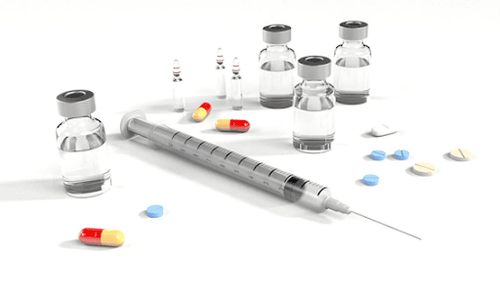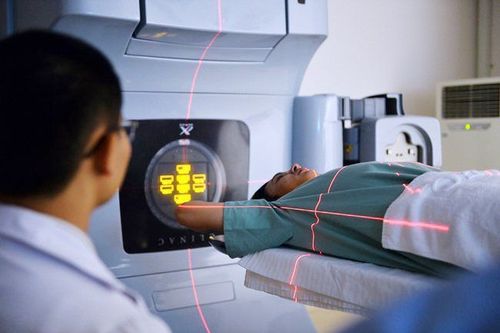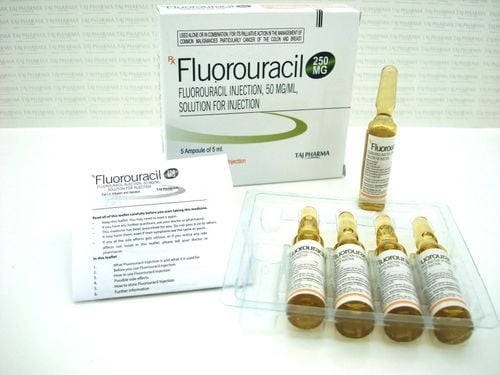This is an automatically translated article.
The article is professionally consulted by doctors working at Oncology Center - Vinmec Central Park International General HospitalRadiation therapy is a very specialized treatment and is a common treatment for breast cancer patients. The doctor will create a very detailed treatment plan for each patient, depending on the type of cancer, the stage of the cancer, and other treatments (if any) that the patient is receiving.
1. What is radiation therapy?
Radiation therapy is the use of high-energy X-rays to treat cancer. Controlled high-energy rays, emitted by a machine called a linear accelerator, can destroy and kill cancer cells in the area of the body being treated.
Radiation therapy also affects normal cells in the treatment area, but these cells usually recover after treatment. Radiation therapy is usually given over a period of time so that the treatment has the greatest effect on killing cancer cells while limiting damage to normal cells.
Radiation therapy can also be given using radioactive tubes that are inserted into the area of cancer, called brachytherapy or internal radiation therapy.
2. When is radiation therapy indicated?
Radiation therapy is a very specialized treatment and is a common treatment for breast cancer patients. Your doctor will create a very detailed treatment plan for you, depending on the type and stage of your cancer and the other treatments (if any) you're receiving. Remember that every patient is different, so you should not compare your treatment plan with other patients.

Xạ trị là phương pháp điều trị phổ biến cho bệnh nhân ung thư vú
2.1 Radiotherapy after surgery
In most cases, radiation therapy is indicated after surgery. This reduces the risk of the cancer coming back by removing any cancer cells that may still be left in the area. If you have a lump that has been removed, you will most likely receive radiation therapy for the remaining breast tissue.
If you have had a mastectomy (removal of the entire breast), but the tumor is large or the cancer has spread to the lymph nodes under your arm, you may receive radiation therapy to the chest wall.
2.2 Radiation therapy combined with chemotherapy
You can irradiate first, chemically later; anterior, posterior; or chemo-radiation simultaneously. The doctor will recommend the most suitable regimen for each type of disease and patient's condition.
2.3 Advanced cancer
Radiation therapy can also be used in more advanced stages of breast cancer. This is called palliative treatment. It can help control previously untreated disease in your breast, or help relieve symptoms associated with cancer; for example pain, spinal cord compression or tumors caused by cancer spreading to other parts of the body (secondary breast cancer).
In such situations, the extent of breast cancer treatment with radiation therapy will depend on your individual circumstances. Usually, the treatment will be given over a much shorter period of time.

Xạ trị cũng được sử dụng trong các giai đoạn ung thư vú tiến triển sâu hơn.
2.4 Before surgery
Sometimes, you may have radiation therapy to reduce the size of a large tumor before surgery.
3. How is treatment arranged?
The length of treatment depends on your condition and other treatments may be given first. Radiation therapy usually takes place every day, Monday through Friday, for 5 to 6 weeks.
First, you will see a radiation therapist (radiologist) in the Outpatient Department for advice on your treatment. A follow-up appointment will be made to plan your treatment. You will then be confirmed a specific date to start.
Radiation therapy is a specialized treatment. You are usually treated as an outpatient. If you have problems with your appointment, let the radiation therapist know in advance.
It is important that your treatment continues as planned and that you do not miss any appointments. For example, if you have a holiday booked in advance, tell the radiation therapist who is treating you so that the appointment can be rescheduled, if possible.
Every day the treatment staff will ask how you are doing. If you have any problems, talk to your radiation therapist or nurse. An appointment can be arranged with your doctor or breast care nurse, if needed. Radiation therapy does not expose you to radiation, so close contact with others is safe during treatment, and many people continue to work during treatment.
4. Treatment plan
Your treatment is individually planned, so do not compare the location and number of treatments with other patients. Treatment planning, also known as simulation, finds the exact area to be treated, using the most appropriate dose of radiation, while causing the fewest possible side effects.
5. Simulation
Simulation means planning your radiotherapy treatment. A special X-ray machine called a simulator is used to plan your treatment. You will be invited to the radiation center to help plan this.
You may be a little nervous when you first go to the radiation center. On that day, try to bring someone close to you so you have a better mentality. You should choose old bras and outerwear because ink markings on the area to be radiotherapy can stain your underwear, which can be difficult to remove from clothing.
Simulation does not hurt you. However, you will be lying on a hard table in a room with machines above it, which can be uncomfortable. You will have to partially remove your clothing to expose the skin of your breasts. Your simulation session can last from half an hour to an hour. During this time, you need to lie still while the specialists and radiation therapist take some X-rays and calculate the dose. Some simulations may use CT simulation instead of X-rays to plan treatment

Máy chụp CT mô phỏng tại Bệnh viện Đa khoa Quốc tế Vinmec
6. How is radiation therapy indicated?
When you arrive for radiation therapy, you will be asked to take off your shirt up to your waist and lie on the treatment table. The radiation therapist will position you so that you are in the same position each time you have radiation therapy. Again, you will be alone in the room, but the radiation therapist can see and hear you at all times from the external monitor. You can also talk to staff through an intercom.
Once in the correct position, you will be asked to lie still and breathe normally.
The radiation therapist will position the machine at different angles to direct the beam to the required areas. You won't feel any pain during radiation therapy, but you may feel some discomfort in your arm (such as numbness in your arm) because you have to keep it in the same position throughout the treatment. .
However, the treatment only lasts a few minutes. When you're done, put your shirt back on and the doctor will schedule a follow-up appointment. This will become a habit until the treatment plan is finished. Radiation technicians work very closely with the doctors and other staff in the unit. They can give you help and advice about any aspect of your treatment. If you are worried or confused about something, consult them. Even if you feel embarrassed, they will be happy to advise you professionally.
7. Did you experience any side effects?

Rụng tóc là biểu hiện thường thấy ở bệnh nhân xạ trị
Radiation therapy can cause some side effects. Side effects occur because radiation therapy affects normal cells while killing cancer cells. Side effects are usually limited to the area of the body being treated. Normal cells can recover despite short-term or long-term damage caused by radiation.
Most side effects of radiation therapy are temporary, but some can be permanent. Some side effects can even occur months or years after treatment. Each body responds differently to treatment, but certain side effects are more common than others.
8. What are the common side effects?
Skin changes
A skin reaction during or after radiation therapy to the breast may develop. The extent of this reaction will depend on several factors, including the dose of your treatment and the sensitivity of your skin. You may experience pain and skin itching in the treatment area 10-14 days after treatment begins. Your skin may peel off with continued treatment and may become red, sore, and dry.
After finishing radiation therapy, the effects on your skin may continue to worsen for about a week afterward. Everyone's skin reacts differently to radiation. Your skin may be sore, while someone else's is unaffected. Your healthcare team will check your skin regularly and provide appropriate treatment for any side effects.
Pain or discomfort
You may have pain and swelling in the breast area right away or after. These symptoms may continue for a while after treatment ends. If treatment includes the center or collarbone area, a small area where your throat (esophagus) may be affected. This can cause heartburn and discomfort, but usually improves with medication prescribed by your doctor.
Tired

Mệt mỏi là tác dụng phụ của xạ trị
During the weeks you are being treated, your body uses a lot of energy, so you may feel more tired than usual, especially as treatment continues. The stress of consultations, exams, cancer diagnoses, and the journey to the hospital can all add to this fatigue. Research shows that a balance between exercise and rest can help reduce this feeling of fatigue. A healthy diet and fresh air can also help a lot.
Other side effects
Sometimes part of the lung behind the radiation treatment area becomes inflamed. This can cause a dry cough or difficulty breathing, but usually the body heals itself.
If you are a young woman breastfeeding, you probably will not be able to breastfeed on the breast being treated.
9. What are late side effects?
Some side effects may not appear until treatment is over. These are called late side effects. Some late side effects can be serious and permanent. Radiation therapy to the breast and armpits sometimes creates hard tissue, called fibrosis, and is caused by a buildup of scar tissue. If fibrocystic breast condition becomes severe, the breasts may become noticeably smaller and firmer.
Avoid using any perfumes, deodorants, bandages, creams or lotions on the treated area unless advised to do so by the radiation therapist.
Gently wash the treated area with warm water, in the bath or shower, and dry with a soft towel. Do not rub the irradiated area. Some hospitals may allow you to use a mild, unscented soap.
Avoid exposing the treated area to direct sunlight for one year after treatment. Once treatment is complete, the skin in the treated area is at a higher risk of sunburn, so it is important to keep the area covered or to regularly apply sunscreen. During treatment, you should avoid high-temperature therapies, such as thermal pads, saunas, hot water bottles, or cold packs.
A soft cotton bra or jacket will keep you comfortable. You may also find it more comfortable to go bra-free for a while after your treatment. If you wear pacifiers, you may find the softer ones better than your silicone ones.

Áo lót bằng vải cotton mềm sẽ giúp bạn cảm thấy thoải mái
A healthy, balanced diet with plenty of fluids can help your body better cope with the effects of treatment. Try not to expect too much of yourself during treatment as your energy levels will be low. Do not swim in chlorinated water (which is abundant in public pools) during treatment and for 3 to 4 weeks after treatment ends. If you see a skin reaction, don't worry, it will be completely healed about 4 weeks after the treatment. The nursing staff at the radiotherapy center will advise you on how to best take care of your skin. You may also notice small, dilated blood vessels under the skin. Severe fibrosis can also block lymphatic drainage in your arm and cause swelling called lymphedema after breast cancer treatment in your arm.
If you notice any swelling in your arms, hands or breasts, ask for a referral to a professional therapist for treatment.
Other late effects
Other possible side effects later on include:
Weakness in bones in the area, for example, your ribs and collarbone; Nerve damage in the arm, which can cause tingling, numbness, pain, weakness, and possibly loss of some movement; Cirrhosis of your upper lungs, which can cause a dry cough and shortness of breath.
10. Effects on other treatments
If you are planning breast reconstruction, breast radiation therapy may affect the types of breast reconstruction you may have. Some forms of breast reconstruction tolerate radiation therapy better than others. Your breast doctor and nurse will give you more helpful information.
Your skin may also feel dry after radiation therapy . In this case, using a moisturizer as recommended by the radiation therapist can improve the situation. The breast tissue where it was treated may feel firmer than before. It's important to note what's normal for you.
11. What can I expect after treatment?

Mặc dù hoàn thành xạ trị thường là một niềm hy vọng, nhiều người vẫn cảm thấy khá dễ bị tổn thương
Although completing radiation therapy is often a hope, many people still feel quite vulnerable. It may take a while before you feel back to a normal pace.
Try not to expect too much of yourself in the first few days and weeks after treatment. You may feel tired for a while, but gradually you will start to feel better. For some people this can take several months and sometimes up to a year
You will be assigned regular follow-up to check on your progress in recovery. But if at any time you have concerns or concerns, contact your radiation therapist so that an earlier appointment can be arranged for you.
12. How can I control myself well during radiation therapy?
During radiation therapy, you may feel quite sad, scared, or have a hard time adjusting to what's happening to you. Fear of the unknown is a common, normal human fear, so learn as much as you can about treatment at any point during or after treatment, remembering that you are not alone. There are many people around who can help you to be more in control of yourself. You may find it helpful to visit the radiation center first, as you will have a clear understanding of what to expect. If you are feeling low, tired, worried or crying at any of you, the medical team is treating you. Try to let others know how you're feeling, especially family and friends, so they can support you.

Trung tâm Ung bướu - Bệnh viện Đa khoa Quốc tế Vinmec Central Park cung cấp dịch vụ xạ trị điều trị ung thư
Oncology Center - Vinmec Central Park International General Hospital is modernly built according to international standards, using a multi-specialist approach model in diagnosis and selection of appropriate treatment regimens for each patient. contribute to comprehensive patient care. Vinmec Central Park Cancer Center has outstanding advantages in cancer treatment such as:
Vinmec Convergence of experts who are good at radiation therapy, chemotherapy and surgery, equipped with modern facilities. The most modern radiotherapy planning system and Truebeam in Southeast Asia, with the outstanding advantage of minimizing the effects of radiation on benign tissues compared to X-rays, reducing irradiation time and the risk of adverse effects. side effects for patients.) helps effectively treat common cancers: Lung, Head, neck, breast, etc. As the first hospital in Ho Chi Minh City to apply autologous immunotherapy, Vinmec Hospital Central Park can treat cancer with multimodal cancer treatment protocols suitable for each case, bringing high treatment efficiency, providing an additional reliable cancer examination and treatment address for people. people in Ho Chi Minh City and surrounding areas, so that people do not have to go abroad for treatment.
Please dial HOTLINE for more information or register for an appointment HERE. Download MyVinmec app to make appointments faster and to manage your bookings easily.













